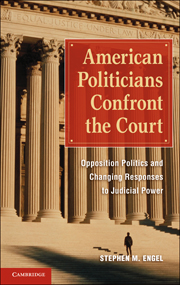 American Politicians Confront the Court
American Politicians Confront the Court Republicanism, Loyal Opposition, and the Emerging Legitimacy of Multiple Constitutional Visions
Published online by Cambridge University Press: 05 June 2012
In contrast to Martin Van Buren's ideas about a disloyal aristocratic minority opposition and single-party constitutionalism, Abraham Lincoln, as the first Republican president and a consummate party politician, conceded the political opposition's right to rule and endorsed the idea that constitutional interpretations could legitimately vary. Lincoln's ideational innovation was compelled by the secession crisis, and it carried vast consequences for how future politicians would manipulate judicial power. Just as the Framers relocated the source of sovereignty from the legislature to the people in order to stem the crisis of governance created by the Articles of Confederation, and just as Van Buren altered the meaning of party from an institution inimical to civic health to one that promoted civil stability in an effort to end the “corruption” against which the Madisonian design proved ineffectual, Lincoln, seeking to prevent the complete breakup of the republic, would re-define the status of opposition and, with it, the notion of what counted as legitimate constitutional interpretation.
This chapter begins by detailing politicians' ideas about opposition and party during the 1850s and 1860s. The first section examines how early Republican leaders, especially William Seward, characterized Democrats in civic republican terms, that is, as an anti-constitutional conspiracy, and cast Republicans not just as competitors but also in the Van Burenite framework of a singular constitutional party replacement.
To save this book to your Kindle, first ensure no-reply@cambridge.org is added to your Approved Personal Document E-mail List under your Personal Document Settings on the Manage Your Content and Devices page of your Amazon account. Then enter the ‘name’ part of your Kindle email address below. Find out more about saving to your Kindle.
Note you can select to save to either the @free.kindle.com or @kindle.com variations. ‘@free.kindle.com’ emails are free but can only be saved to your device when it is connected to wi-fi. ‘@kindle.com’ emails can be delivered even when you are not connected to wi-fi, but note that service fees apply.
Find out more about the Kindle Personal Document Service.
To save content items to your account, please confirm that you agree to abide by our usage policies. If this is the first time you use this feature, you will be asked to authorise Cambridge Core to connect with your account. Find out more about saving content to Dropbox.
To save content items to your account, please confirm that you agree to abide by our usage policies. If this is the first time you use this feature, you will be asked to authorise Cambridge Core to connect with your account. Find out more about saving content to Google Drive.